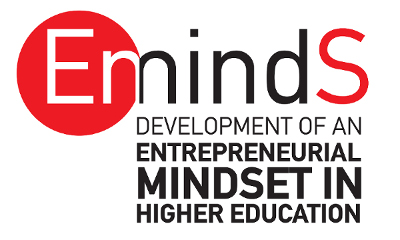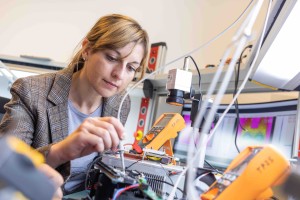EmindS
Development of an Entrepreneurial Mindset in Higher Education

The development of the entrepreneurial capacity of EU citizens has been one of the key policy objectives for the EU for many years. The benefits of entrepreneurship education are not limited to start-ups, but also an individual’s ability to turn ideas into action. The important role of education in promoting more entrepreneurial attitudes and behaviours is now widely recognized. EmindS aims to develop entrepreneurial mindset of Higher Education and VET students based on the EntreComp competence, through the application of a systematic methodology using student centered innovative approaches.
EmindS aims to develop entrepreneurial mindset of Higher Education and VET students based on the EntreComp competence, through the application of a systematic methodology using student centered innovative approaches.
The specific objectives of EmindS are:
- Validate EntreComp and use it as the framework.
- Develop two assessment tools in two different EQF levels to assess the Entrepreneurship Competence of Higher Education and VET students.
- Identify and use innovative student centered learning approaches to be used for the education of HE Students and VET. Such approaches are the Action Learning Sets and the EntreChallenges which are challenges to be resolved in an experiential way.
- Develop materials to be used in non traditional learning environments, using student centered approaches (Action Learning and EntreChallenges, both in 2 EQF Levels).
- Develop an installation and replication manual to describe the systematic approach for the development of the entrepreneurship competence in order to assist other Higher Education Institutions and VET providers to replicate the system.
The methodology of the project is the following:
- Validation of EntreComp and translation of the competences identified into learning outcomes through the use of focus groups and expert input.
- Development of an assessment tool in two levels (5 and 6) to assess the entrepreneurial mindset of students.
- Action learning materials are being developed (with the inputs from experts of the consortium) and used by 48 students during 15 Action Learning Set meetings (per country). Meetings and materials are evaluated. Wrap up webinars also take place for reflection and evaluation of results.
- A package for mentors is being developed that includes a curriculum, a webinar (synchronous - asynchronous) and a mentor’s guide. Mentors include academics, vet trainers and people from the industry.
- Students then participate in EntreChallenges. Brainstorming workshops are being implemented in order to identify ideas for the challenges. The best ideas are selected and challenges are designed. For each of the challenges several activities are developed to guide the students towards the development of their competences. EntreChallenges will be implemented in 5 distinct phases:
- Introduction
- Learning Activity 1
- Remote team working
- Learning Activity 2
- Project Completion
- The last stage of the process is the composition of an installation & replication manual. The installation manual includes a step by step approach (describing the different steps of the project) for the development of entrepreneurial mindsets of students. Through a web application interested institutions can find partners to replicate the system.
Project Partners:
M.M.C. Management Center Limited, Nikosia, Link;
Universität Nova Gorica, Nova Gorica, Link;
Metropolia, Helsinki, Link;
Industry Disruptors Game Changers, Tavros, Link;
Dimitra Education & Consulting, Link;






